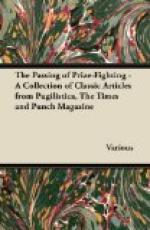Although, when luxuries must be resigned,
Such as cigars or even breakfast
bacon,
My hitherto “unconquerable mind”
Its philosophic pose has not
forsaken,
By one impending sacrifice I find
My stock of fortitude severely
shaken—
I mean the dismal prospect of our losing
The genial cup that cheers without bemusing.
Blest liquor! dear to literary men,
Which Georgian writers used
to drink like fishes,
When cocoa had not swum into their ken
And coffee failed to satisfy
all wishes;
When tea was served to monarchs of the
pen,
Like JOHNSON and his coterie,
in “dishes,”
And came exclusively from far Cathay—
See “China’s fragrant herb”
in WORDSWORTH’S lay.
Beer prompted CALVERLEY’S immortal
rhymes,
Extolling it as utterly eupeptic;
But on that point, in these exacting times,
The weight of evidence supports
the sceptic;
Beer is not suitable for torrid climes
Or if your tendency is cataleptic;
But tea in moderation, freshly brewed,
Was never by Sir ANDREW CLARK tabooed.
We know for certain that the GRAND OLD
MAN
Drank tea at midnight with
complete impunity,
At least he long outlived the Psalmist’s
span
And from ill-health enjoyed
a fine immunity;
Besides, robust Antipodeans can
And do drink tea at every
opportunity;
While only Stoics nowadays contrive
To shun the cup that gilds the hour of
five.
But war is war, and when we have to face
Shortage in tea as well as
bread and boots
’Tis well to teach us how we may
replace
The foreign brew by native
substitutes,
Extracted from a vegetable base
In various wholesome plants
and herbs and fruits,
“Arranged and blended,” very
much like teas,
To suit our “gastric idiosyncrasies.”
It is a list for future use to file,
Including woodruff, marjoram
and sage,
Thyme, agrimony, hyssop, camomile
(A name writ painfully on
childhood’s page),
Tansy, the jaded palate to beguile,
Horehound, laryngeal troubles
to assuage,
And, for a cup ere mounting to the stirrup,
The stinging-nettle’s stimulating
syrup.
And yet I cannot, though I gladly would,
Forget the Babylonian monarch’s
cry,
“It may be wholesome, but it is
not good,”
When grass became his only
food supply;
Such weakness ought, of course, to be
withstood,
But oh, it wrings the teardrop
from my eye
To think of Polly putting on the kettle
To brew my daily dose of stinging-nettle!
* * * * *
AT THE PLAY.
“DEAR BRUTUS.”
There are great ways of borrowing, as EMERSON said, and in his new Fantasy Sir JAMES BARRIE has given us a very charming variation on A Midsummer Night’s Dream (with echoes of Peter Pan and The Admirable Crichton). Certainly I got far more fun out of his deluded lovers in the Magic Wood than I ever extracted from the comedy of errors which occurred between the ladies and gentlemen of the Court of Theseus.




